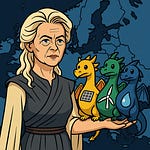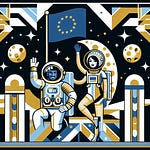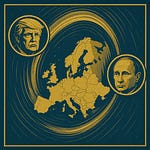If you want to understand the present and future of Europe you need to know about the German history.
Below is a cheat sheet to learn about the history of Germany in few minutes. 🇩🇪⏱️
For more information you can listen to the podcast.
It is a story of constant evolution, victories and defeats, war and innovation.
Germany does not exist without Europe. It was shaped by the conquests of the Romans and the, often challenging, coexistence with the French and the Austrians. And yet it shaped a unique cultural identity that would later change Europe and the world.
Many times over.
Timeline of Main Events
Roman rule and early Germania 🏛️
c. 500 BC 🗣️: the approximate beginning of the development of a distinct Germanic language, through a sound shift called "Grimm's Law". This marks the point where Germanic languages diverge from other Indo-European ones.
58 BC 👋: Julius Caesar, as governor of Cisalpine Gaul, mentions and popularises the term "Germani" for the tribes north of the Rhine denoting a distinction from the Gauls. Caesar describes the Germans, highlighting their focus on hunting and warfare, their limited agriculture, their disregard for fixed land ownership, and their unusual customs.
17 BC: German tribes cross the Rhine and capture the Roman V Legion's eagle, leading to a Roman mobilisation for the outright conquest of Germania.
c. 100 AD 🇮🇹: The Romans are in control of much of southwest Germany.
c. 160 AD 🧱: The limes Germanicus, a fortified border, is built formalizing Roman rule in the region.
235 AD ✊: Roman armies on the Rhine mutiny and proclaim Maximinus Thrax, son of a Goth, as emperor. 284 AD : The lands beyond the Rhine and Danube are lost to Roman control, a new limes is constructed along riverbanks.
297 AD: The Franks force their way across the Rhine, into what is now modern day Holland/Belgium.
Mid 4th Century AD: The Franks become loyal foederati (allies) of the Roman Empire.
Charlemagne & the foundation of France & Germany 🇪🇺
754 AD 👑: The Deal of Saint-Denis; Pope Stephen blesses two boys, one of whom becomes Charlemagne.
842 AD: The Strasbourg Oaths, between Charles the Bald and Louis the German, demonstrating the linguistic and cultural divergence in the region.
843 AD 🇩🇪🇫🇷: The Treaty of Verdun divides Charlemagne's empire among his grandsons into the East Frankish (later Germany), West Frankish (later France), and Middle Frankish (soon to be partitioned among the other two). The border of Louis's realm was along the Rhine, but its exact eastern end was uncertain, and this uncertainty was carried along until much later.
948 AD: Otto I (the Great) establishes new bishoprics at Havelberg and Brandenburg, expanding his influence beyond the Elbe.
The rise of the Germanic world 🇩🇪
1231 🤴🤴🏻🤴🏼: The princes compel Frederick II to sign the Privilege of Worms, which confirms their right to rule in their own lands.
1368 🇳🇴🇩🇰: The Hanseatic League declares war on Norway and Denmark.
1517 📜✊: Martin Luther posts his 95 Theses in Wittenberg, sparking the Protestant Reformation.
1630 🔫: In the Thirty Years' War, imperial forces under Tilly and Wallenstein look like they're going to win; however, Protestant Sweden and Catholic France begin to fear this and intervene on the Protestant side.
1648 🤝: The Peace of Westphalia ends the Thirty Years' War.
1657 👑: Friedrich Wilhelm manages to become fully sovereign Duke of Prussia, building a professional army.
1683 🇹🇷: Austria plays a leading role in the defeat of the Turks outside Vienna.
1740 🇦🇹: Frederick the Great becomes king and immediately seizes Silesia from Austria, starting the 125-year battle for German dominance between Austria and Prussia.
1756-1763: The Seven Years' War, where Prussia with victories against France.
1774 🧠: Goethe’s Götz von Berlichingen breaks away from traditional French staging. His book The Sorrows of Young Werther becomes a bestseller.
From shreds to riches 🌅
1806 😮: Battles of Jena-Auerstadt see Napoleon defeat the Prussians.
1815 😮💨: Napoleon loses the Battle of Waterloo.
1848-1849: German Revolution; an attempt at unification fails when the Prussian king refuses the crown.
1862: Otto von Bismarck, before taking power, tells Disraeli about his plans.
1864: Prussia and Austria defeat Denmark.
1866 🇩🇪: Austro-Prussian War, where Prussia defeats Austria, and the North German Confederation is formed.
1870 🇩🇪🇩🇪🇩🇪: Franco-Prussian War; France is defeated, and the German Empire is formed, with the King of Prussia as German Emperor.
1879: The Dual Alliance between Germany and Austria is formed against Russia.
1890: Kaiser Wilhelm II dismisses Bismarck.
1898 🚢: First great Fleet Law, solidifying the German naval build-up.
And then again to shreds 🤯
1904 🤝: Britain and France form an alliance, the Entente Cordiale.
1914-1918 💥: German defeat in World War I leads to the end of the German Empire.
1919 🌧️: The Treaty of Versailles imposes severe conditions on Germany and the Weimar republic takes its change.
1920s-1930s: German army leaders develop new concepts of a militarist society that would later be reflected in the Nazi regime.
1930: Nazi breakthrough at national level is overwhelmingly due to East Elbian voters.
1933 😱: Hitler becomes Chancellor.
1936: Remilitarization of the Rhineland and the Berlin Olympics.
1938: Munich Agreement where Czechoslovakia is forced to hand over the Sudetenland to Germany.
1939 🪖: Germany invades what remains of Czechoslovakia, makes a pact with Russia to partition Poland, and launches a program to purify the German race. WWII begins.
1945 😮💨: The end of WWII with the defeat and division of Germany.
1948: The Berlin Blockade is launched by the Soviets in response to currency reform, and the Allied airlift to supply Berlin begins.
1949: The Federal Republic of Germany (West Germany) is created, with Konrad Adenauer as Chancellor.
1990 🌅: Reunification of Germany; the former East Germany is absorbed into the Federal Republic.
Post-reunification: The economic integration of East Elbia proves more difficult than expected, with lingering divisions and resentment.
If you want a still concise but more detailed narration of German history you can read the book bestseller book “The shortest history of Germany” on which this summary and podcast were based.












